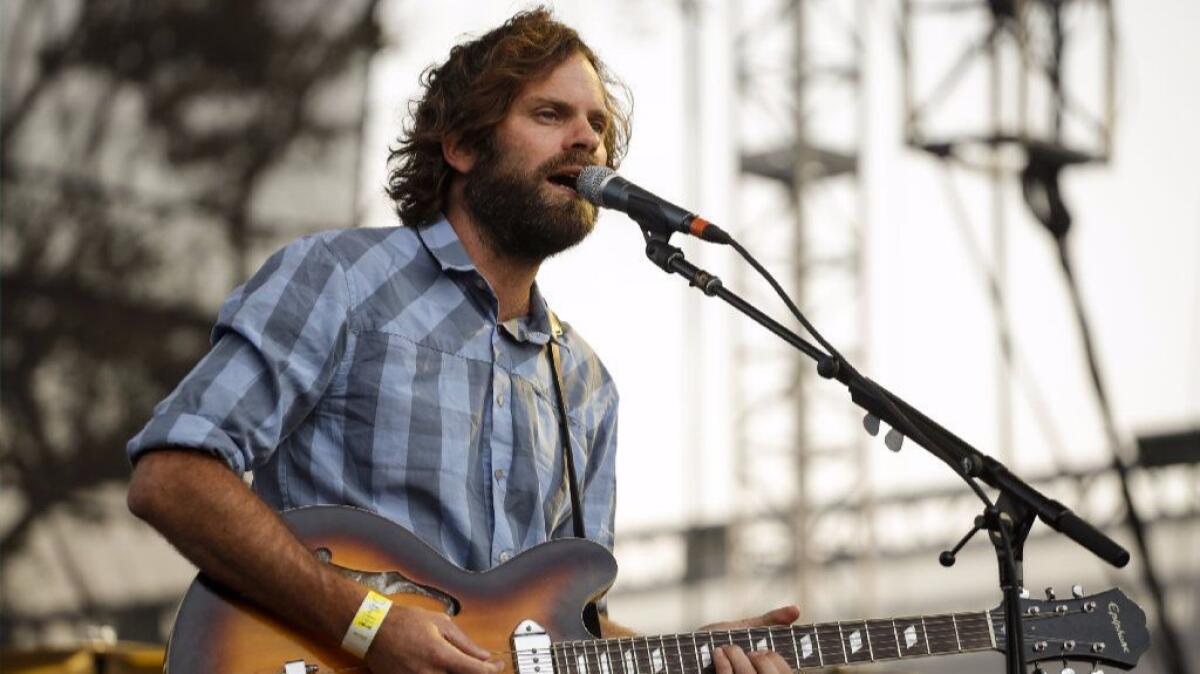Gone for 20 years, Slowdive is back — and worth the wait
- Share via
The members of Slowdive never foresaw this twist in their story. Well on their way to becoming a revered footnote in the history of 1990s rock, the seminal English shoegazers are reunited, and even relevant again.
After a decades-long hiatus that most everyone figured was forever, the original lineup of Slowdive is back with “Slowdive,” its first and — let’s just say it — most satisfying album in 22 years. The five-piece band has suddenly catapulted from cult favorites to main attraction.
“I mean, I never thought we’d be talking about a new Slowdive record in 2017 either,” singer-guitarist Rachel Goswell said recently in advance of Slowdive’s Friday-night performance at this weekend’s FYF music festival at L.A.’s Exposition Park. “This would not have happened if all of us weren’t on board. Because it wouldn’t be Slowdive without all of us.”
Slowdive’s story began in late 1989 — and screeched to a halt just six years and three albums later. Its discography, particularly 1993’s “Souvlaki,” helped lay the cornerstore of shoegaze, a celestial strain of ’90s rock that found beauty in heavy distortion at the intersection of loud and soft.
Time has been kind to Slowdive and its shoegazing contemporaries; a renaissance in recent years has ushered in new music and tours from My Bloody Valentine, Lush and Ride. And you hear its echoes in modern bands such as Beach House, Deerhunter and M83.

“It’s interesting that this style of music remains interesting to a new generation,” said Neil Halstead, the group’s principle songwriter, who also plays guitar and shares lead vocals (and luminous harmonies) with Goswell, in a separate phone interview.
In 2014, after a festival invitation but before the new album had been made, Slowdive tested the waters with a U.S. tour that packed venues with teary-eyed fans (this writer included) overcome with emotion to see the band back in its prime.
“A lot of those shows were completely inexplicable to us,” said guitarist Christian Savill. “We’d walk up to these big venues that were sold out and think, ‘Surely this is a mistake.’ Because that had never happened to us before.”
The band — which also includes Simon Scott on drums and Nick Chaplin on bass — knew it wanted to record new music, but kept expectations in check.
“Always in the back of our minds was that if it wasn’t very good, we’d just pretend it never happened and never put it out,” Halstead said. “So we were quite happy not to look for a record label and that enabled us to do it without much pressure.”
But of course, labels came calling, and Slowdive found a home on Dead Oceans, the prominent indie that’s part of the Secretly Group.
“They were looking for a label that was enthusiastic about them but also considered the album as new music,” said Phil Waldorf, one of Dead Oceans’ co-founders. “I think we were all shocked at how good and how fresh it sounded. Some of that is a testament to the fact that they never made a bad record. They put out three fantastic records and then stopped.”
Even without its fairy-tale backstory, we would still be talking about “Slowdive,” the way its sumptuous textures capture both sides of the band: clanging, ambient experimentalists (“Star Roving”) with the heart and soul of a classic pop band (“Sugar for the Pill”).
“It’s not a radically different record,” admitted Halstead. “It’s a familiar record, and it would have been really perverse of us to put the band back together and put out a record that doesn’t particularly sound like Slowdive.”
You could call the new album a comeback, except the latest iteration of Slowdive feels more resonant than what fans first heard in the early ’90s. They’ve evolved as musicians, and the new songs’ sophistication reflects that. In the intervening years, members pursued various projects; most notably, Halstead and Goswell anchored the dream-pop trio Mojave 3 and released solo albums of mostly pastoral folk-pop.
Savill, an underrated guitar god whose monstrous prowess gives the band its most transcendent moments in concert, took a circuitous path back into the spotlight. He lived in the U.S. for a stretch, working as a janitor in Asheville, N.C., oblivious to the band’s growing legacy until young fans started showing up at the store and hounding him about guitar gear.
“One time I was vacuuming some mats in the produce aisle, and Slowdive came on the internal radio. And I thought, ‘My God, this is weird. What has my life become?’” Savill said.
“Our story is the story of so many young bands,” he added, “but the difference is that not many of the bands that get chewed up and spat out get a second go of it — and bigger than the first time.”
Follow me on Twitter @jreedwrites.
More to Read
The biggest entertainment stories
Get our big stories about Hollywood, film, television, music, arts, culture and more right in your inbox as soon as they publish.
You may occasionally receive promotional content from the Los Angeles Times.











